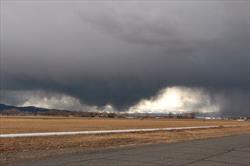Bob Judd, DVM, DABVP (Equine Medicine), DABVP (Canine and Feline Practice)
IMG_2414.JPG

If a natural disaster affects your home, it is terrible and can be much more difficult if you have livestock. Livestock can be even more difficult to handle during a disaster due to their size. Most livestock, except horses, are not well-trained.
In the online publication TexVetPets, Dr. Erin Gatz, DVM from the Texas Veterinary Medical Association, recommends having current medical records of vaccination and disease testing, such as Coggins test reports, for your horses. Have pictures of your horses and ideally, have your horses microchipped.
Keep ear tags on small ruminants and tags or brands on cattle for identification during an emergency or disaster. A non-toxic paint can be used on cows for short-term identification.
Have a set evacuation route as part of a written evacuation plan. Generally, the local police department will decide the best routes.
Determine the best area with the highest ground nearby, and, if possible, a shelter to pasture livestock in case of a flood. You may be able to evacuate some of your livestock depending on the amount of time you have and the number of livestock involved.
Check to make sure your trailer and trucks used to haul livestock are in good shape. This includes having good tires on the vehicles. If you are using your trailer as a storage area, clean it out if possible, so it is ready when you receive notice of a potentially threatening event.
Have at least 3 days of feed and water available, and plan ahead by knowing where you can take your horses and other livestock in a disaster. Talk to your veterinarian if you have medical concerns so you can be as prepared as possible for anything that comes your way.